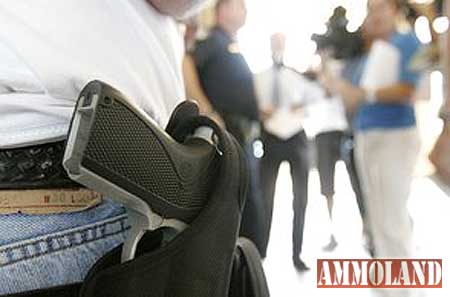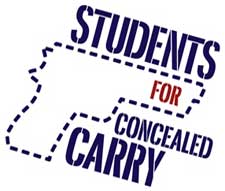

Austin, TX -(AmmoLand.com)- Anti-campus carry activists at the University of Texas at Austin have created a self-fulfilling prophecy—they’ve spent so much time and energy claiming that campus carry is going to cause real problems for the university that their warnings are scaring off top talent, causing a real problem for the university.
Both the Los Angeles Times and The Daily Texan recently reported that Siva Vaidhyanathan, a finalist for the deanship of UT-Austin’s Moody College of Communication, withdrew his name from consideration because he doesn’t believe he would be willing to discipline a professor who refuses to abide by the state’s new campus carry law.
As Students for Concealed Carry (SCC) pointed out in a February 25 statement titled “Campus carry isn’t bad for higher education; paranoia about campus carry is,” fear of campus carry at UT-Austin is causing far more problems than has the actual implementation of campus carry on the more than 100 U.S. college campuses where it’s currently allowed. When a thousand professors get together to hype a particular concern—be it campus carry, insufficient state funding for higher education, UT’s deteriorating campus infrastructure, or Austin’s oppressively hot summers—that harsh cacophony of voices is going to have an adverse effect on recruiting, whether justified or not.
Antonia Okafor, Southwest regional director for SCC, commented, “Campus carry is a molehill that groups like Gun Free UT have made into a mountain. Now those same groups want to blame campus carry when the nation’s top academic talent opts for less mountainous terrain.”
Because opponents of campus carry have spent so much time and energy overstating the statistically insignificant dangers of campus carry, it should come as no surprise that people who don’t know any better are starting to believe them. Well-intentioned but misguided activists at UT-Austin have created a moral panic akin to the equally baseless “Satanic panic” of the late 20th century. And like any moral panic, this one is fueled in part by the media.
The aforementioned L.A. Times article on Texas’s campus carry law notes, “The experience of Utah and Colorado does not support the claim that having more gun owners on campus increases security, according to a study last year by the Campaign to Keep Guns off Campus, a nonprofit based in Croton Falls, N.Y. In both states, crime rates on college campuses increased while the student populations dropped.”
That is an interesting way of stating the facts, given that neither a promise to lower campus crime rates nor a pledge to increase student enrollment was among the generally accepted talking points for legalizing the licensed concealed carry of handguns on Texas college campuses and that there is no evidence that licensed concealed carry has negatively impacted either crime rates or student enrollment at the colleges where it’s currently allowed.
SCC—the nation’s only advocacy group dedicated to lobbying for the legalization of campus carry—has consistently pointed out that campus carry is about personal protection, not campus protection; that college campuses are statistically very safe; and that only a tiny percentage of academics are licensed to carry concealed handguns. All of that contradicts the notion that campus carry will lead to a drop in crime rates.
If SCC doesn’t think campus carry is likely to lower on-campus crime rates, who does the L.A. Times article seek to rebut with the statement that the history of campus carry “does not support the claim that having more gun owners on campus increases security”? That statement strikes down a straw man constructed by the author and, despite all evidence to the contrary, leaves readers with the distinct impression that campus carry may be responsible for the purported increase in on-campus crime.
Not one college in Utah or Colorado has reported a single incident of a concealed handgun license holder using a handgun to commit a violent crime on campus (and yes, there is a way that anti-campus carry activists and the media could double-check this if they wanted to). There also hasn’t been a single report of an armed license holder being the victim of a violent crime on any of these campuses. Therefore, the findings of the cited study have little bearing on the campus carry debate. In fact, the cited study—which was conducted by a gun-control group and was not peer reviewed—plainly states that its “results certainly do not prove that concealed carry causes more crime.”
The final report of UT-Austin’s campus carry policy working group notes, “Our examination of states that already have campus carry revealed little evidence of campus violence that can be directly linked to campus carry, and none that involves an intentional shooting…We found that the evidence does not support the claim that a causal link exists between campus carry and an increased rate of sexual assault. We found no evidence that campus carry has caused an increase in suicide rates on campuses in other states.” The UT report goes on to state,“We reached out to 17 research universities in the seven campus-carry states…Most respondents reported that campus carry had not had much direct impact on student life or academic affairs.”
The L.A Times article’s reference to college enrollment is equally egregious, in that the aforementioned study uses only two years of data (2012-2013) to intimate that campus carry leads to a decrease in enrollment. Even a cursory review of the raw numbers reveals that this insinuation isn’t supported by a complete view of the data.
After a 2006 court ruling legalized the licensed concealed carry of handguns at all public colleges and universities in Utah, Utah’s public colleges and universities saw record enrollment in 2008, 2009, 2010, and 2011. After slight declines in 2012 and 2013, Utah again saw increased enrollment in both 2014 and 2015. There is no reason to assume causation—legalizing campus carry didn’t cause enrollment to go up—however, there is clearly no negative correlation between student enrollment and the legalization of licensed concealed carry on campus.
The reporter for the L.A. Times draws from one dubious study by a group of activists opposed to campus carry, to lend credence to the claims of activists opposed to campus carry. That’s not journalism; it’s just another form of activism. The article, which includes no comments from proponents of campus carry and makes no attempt to present a clear picture of proponents’ arguments, is nothing more than an editorial masquerading as news.
Along with other alarmist articles, it’s helping to fuel a moral panic—a totally unwarranted mass paranoia—that has already taken a toll on the Lone Star State.
About Students for Concealed Carry:
Students for Concealed Carry (SCC) is a national, non-partisan, grassroots organization comprising college students, faculty, staff, and concerned citizens who believe that holders of state-issued concealed handgun licenses should be allowed the same measure of personal protection on college campuses that current laws afford them virtually everywhere else. SCC is not affiliated with the NRA or any other organization. For more information on the debate over campus carry in Texas, visit WhyCampusCarry.com.
For more information on SCC, visit ConcealedCampus.org or Facebook.com/ConcealedCampus.
